Catholicism
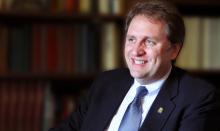
Christians and Jews are mounting campaigns for and against a path to sainthood for British writer G.K. Chesterton (1874-1936), one of the world’s best-known Catholic converts.
Roman Catholic Bishop Peter Doyle of Northampton, where Chesterton lived and worked, has ordered an examination of Chesterton’s life — the first step in what is likely to be a long and unpredictable process toward canonization.

Like most of the world last spring, I watched in fascination as Jorge Mario Bergoglio was elected pope. The first day, I was non-plussed. Another old, white guy? Big surprise. The second day, I began to take notice: he was a Jesuit and he chose the name Francis, the first pope ever to do so. The third day, I got a little discouraged as Catholic pundits and news organizations across the nation scrambled to prop up his conservative credentials and hardline stances. But as the week unfolded, I heard the stories of how he paid his own bills, carried his own bags, and rode in a modest sedan across town and my heart melted a little bit. Then came his ordination, and in one simple gesture, stopping to cradle a disabled man in his arms, he captured my imagination. I was willing to entertain the possibility that he just might be a different kind of pope.
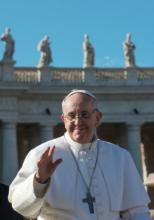
VATICAN CITY — Of all the novelties that Pope Francis has brought to the Vatican, few have endeared him to the public — and unsettled his aides — as much as his penchant for picking up the phone and calling someone out of the blue.
The pontiff with the pastor’s touch has phoned his cobbler in Argentina to inquire about a shoe repair, called to cancel his newspaper subscription, and phoned a woman who was raped by a local police officer to counsel her.
Just this week, Francis phoned a pregnant Italian woman whose fiancé had pushed her to have an abortion.
Anna Romano instead dumped the guy, wrote to the pope about her problems, and on Sept. 3 received a surprise call from the Holy Father, who offered encouragement and even said he would baptize the baby if she couldn’t find a willing priest.
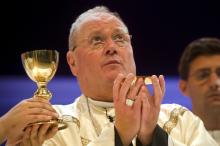
Cardinal Timothy Dolan, archbishop of New York, president of the U.S. Conference of Catholic Bishops, and the most famous funny man in the American hierarchy, went on The Colbert Report Tuesday night to trade quips with another funny guy — and another well-known Catholic — host Stephen Colbert.
Indeed, as Colbert — inhabiting his onscreen persona as a blowhard rightwing pundit — said in welcoming Dolan: “You’re the second most famous Catholic in America – after myself.”
But it was actually Dolan who got the first gag, and giggles, as he walked onto the set and ostentatiously bowed and kissed Colbert’s hand as if he were greeting the pope.
“I’ve got to get a nice big ring if you’re going to be kissing my hand!” replied Colbert, who seemed — uncharacteristically — unsure of how to play the exchange.
In fact, while Colbert was in full faux bloviating mode, he seemed to let Dolan set the pace of their chat; Colbert didn’t poke too hard on topics that could have prompted controversy.
Part of the relative deference may stem from the fact that Colbert is a serious Catholic who has taught Sunday school at his New Jersey parish. Or perhaps it was because Colbert knows Dolan personally, having appeared — out of character — at a forum on faith and humor last year at Fordham University. Or maybe Colbert was a bit out of practice: This was his first show after a two-week summer break, part of which he spent in Rome.

Centuries ago, Roman Catholics helped kick-start the market for religious articles with their insatiable demand for rosaries, icons, prayer cards, and all manner of devotional objects and spiritual souvenirs.
But in recent decades, evangelical Protestants have dominated the art of religious retailing, building a national network of bookstores and stamping the Christian message on almost any item that an American consumer might want, from perfume to golf balls to flip-flops.
Now, Catholic entrepreneurs are looking to catch up, and at the 17th annual Catholic Marketing Network trade show last week (Aug. 6-9) there was a sense that the Catholic sector has a new opportunity to expand — if businesses can update their approach and broaden their inventory beyond the usual catalog of sacred objects.
“If you are a Catholic gift and bookstore and you are not willing to reinvent yourself, you are going to be out of business,” said Alan Napleton, president of the network, which organizes the convention.
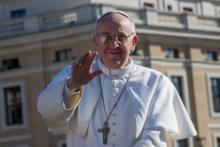
In message published on Friday, Pope Francis took the rare step of personally expressing his “esteem and friendship” to the world’s Muslims as they prepare to celebrate the end of the Ramadan fast.
While it is a long-established Vatican practice to send messages to the world’s religious leaders on their major holy days, those greetings are usually signed by the Vatican’s department for interfaith dialogue.
In his message, Francis explains that in the first year of his papacy he wanted to personally greet Muslims, “especially those who are religious leaders.”
Francis’ predecessor, Pope Benedict XVI, had fraught relations with Muslims. In a 2006 speech he quoted a Byzantine emperor who said Muhammad had only brought “evil and inhuman” things to the world, sparking a worldwide crisis in Christian-Muslim relations.
[T]HE MAJORITY OF THE men and women of our time continue to live daily in situations of insecurity, with dire consequences. ... One cause of this situation, in my opinion, is in our relationship with money, and our acceptance of its power over ourselves and our society. Consequently the financial crisis which we are experiencing makes us forget that its ultimate origin is to be found in a profound human crisis, in the denial of the primacy of human beings. We have created new idols. The worship of the golden calf of old (Exodus 32:15-34) has found a new and heartless image in the cult of money and the dictatorship of an economy which is faceless and lacking any truly humane goal. The worldwide financial and economic crisis seems to highlight the distortions and above all the gravely deficient human perspective, which reduces [people] to one of [their] needs alone, namely, consumption. Worse yet, human beings themselves are nowadays considered as consumer goods which can be used and thrown away. We have begun a throw- away culture. This tendency is seen on the level of individuals and whole societies; and it is being promoted ...
While the income of a minority is increasing exponentially, that of the majority is crumbling. This imbalance results from ideologies that uphold the absolute autonomy of markets and financial speculation, and thus deny the right of control to States, which are themselves charged with providing for the common good. ... I encourage the financial experts and the political leaders of your countries to consider the words of Saint John Chrysostom: “Not to share one’s goods with the poor is to rob them and to deprive them of life. It is not our goods that we possess, but theirs.”
POPE FRANCIS HAS created a new environment in the church. Beginning with asking all the people in St. Peter’s Square to bless him, living in a humble apartment and not the papal palace, placing his own phone calls, paying his own bills, giving simple daily homilies, having conversations with many people, and joyfully mingling with people: These all characterize an incredibly different pope. What has been even more attractive about Pope Francis than his style has been what he has said.
Pope Francis is clearly not on a mission to preserve the status quo. He’s been outspoken about the need for change in the world and in the church. In this he has not been a “professional denouncer.” Rather, he always contrasts what needs to change with the opportunity to be so much more than we are now. Whether it is oppressive global economic policy or clerical ambition, Pope Francis points out that we are called to something more noble and satisfying. The call of Christ is to be our best self. Francis reminds us, “God always forgives. Don’t forget this. God always forgives.”
Another striking aspect of Pope Francis is his constant and passionate concern for people who are poor and vulnerable and his reminder of our responsibilities to them. Whether he is talking to world leaders, bishops, or general audiences, his love of poor people and his firsthand knowledge of their challenges and how we should respond is profound.
RIGHT FROM THE beginning, John Carr saw Pope Francis as a “great sign of hope.”
Carr, who spent more than two decades as the U.S. bishops’ top peace and justice officer, was home, working at his kitchen table, when the white smoke came up announcing the selection of the new pope. “I thought, ‘Oh, my,’ and this guy I didn’t recognize came out,” Carr said. “When he said the name ‘Francis,’ I thought ‘it’s going to be okay.’”
As executive director of the Department of Justice, Peace, and Human Development at the U.S. Catholic bishops’ conference, Carr carried a rather large portfolio. He often tells the story of being introduced by a man who said, “He’s in charge of social development and world peace.” The man’s wife, in Carr’s telling, looked at him and said, “You need to do a better job.”
Since leaving the bishops’ staff last year, Carr has launched a new initiative, based at Georgetown University, aimed at helping lay people “become more informed and engaged in their vocation to be ‘salt, light, and leaven’” in public life. Carr, who visited Sojourners’ office this spring, is encouraged that the election of Pope Francis “has provided incredible visibility, urgency, and passion” around social issues. “When he was going to be elected, his friend said, ‘Don’t forget the poor,’” Carr explained. “A church that moves to the edge to care for the weak and vulnerable is a church you want to be a part of.”

For Catholics—and many others—what happens in Rome doesn’t stay in Rome. The seating of a new pope has the power to affect believers across the globe, in ways direct, indirect, and unpredictable. And when a surprising sea change occurs in a hide-bound, steeped-in-tradition place like the Vatican—the unexpected resignation of a pope, the selection of a Jesuit from the Americas as his replacement, and the powerful symbolism of a new leader who literally stoops to wash a Muslim woman’s feet—people of faith of all traditions sit up and take notice.
In these early days of Francis’ papacy, we asked three prominent Catholic thinkers and leaders to help us understand what it all might mean. How will the spirit of reform that has marked Pope Francis’ first few months in office affect the worldwide church? Will change at the top trickle down to parishes and neighborhoods here in the United States and elsewhere? And what will Francis’ leadership mean not only for Catholics, but for all people of faith engaged in the work of making justice and building peace? —The Editors
CATHOLICS AROUND THE WORLD are transfixed by Pope Francis. We love his simplicity of life, his humble faith, his welcoming attitude to all, and his way of being Christian in the contemporary world that takes its bearings from the poor. Lace and gilt are no longer fashion statements at the Vatican. From his small apartment, the pope speaks bluntly about worrying less about rules and more about love. An utterly refreshing breeze blows through the Catholic Church.
But what does it really mean for Catholics today? The church still reels with the moral and spiritual damage done by members of the clergy as perpetrators or accomplices in the sex abuse scandals, from fiscal mismanagement, and from institutional infighting. Does Pope Francis change that? And what does the new pope signify for the young, for women, and for the many issues that vex the church’s engagement in today’s world?
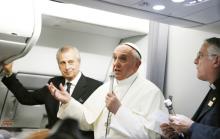
With his open and easygoing manner, Pope Francis charmed the media as much as the faithful during his successful visit to Brazil, the first international pilgrimage of his pontificate.
But it was the pope’s remarks about gay priests, made during a free-wheeling press conference on the return trip to Rome, that drew the most headlines, raising questions about whether the pontiff was signaling a change in the church’s approach to this volatile issue.
When asked by reporters about rumors of a “gay lobby” of clergy in the Vatican who were exposing the Holy See to blackmail schemes and scandal, Francis at first joked that while there’s a lot of talk about such a lobby, “I have yet to find on a Vatican identity card the word ‘gay.’”
Then, in a more serious vein, he added:
“I think that when we encounter a gay person, we must make the distinction between the fact of a person being gay and the fact of a lobby, because lobbies are not good. … If a person is gay and seeks the Lord and has good will, who am I to judge that person?”

Is calling someone a “pagan” a bad thing or a badge of honor? Do we even know what the term means?
Those questions were prompted by a recent speech by Philadelphia Archbishop Charles Chaput in which he lamented the decline of faith and morals in the modern world. “Even many self-described Christians,” he declared, “are in fact pagan.”
And it doesn’t sound like he meant that as a compliment.

We all know that when it comes to the acceptance of LGBT folks, religions differ. But what the religions communicate, and how the people in the pews actually feel, are not the same.
In a word, the rank and file tend to be more accepting than the leadership. What’s striking is how much this LGBT Gap varies from religion to religion, and we can get some idea of the variance from Pew’s new survey of LGBT Americans.
As the measure of institutional messaging, we will use the percentages of LGBT people who say a given religion is unfriendly to them. These range from 84, 83, 79, and 73 percent for Islam, Mormonism, Catholicism, and Evangelicalism to 47 and 44 percent for Judaism and Mainline Protestantism. Then there is the proportion of members of each religion who believe that “homosexuality should be discouraged by society.” That’s 45, 65, 20, and 59 percent for the first four groups; 15 and 26 percent for the last two.
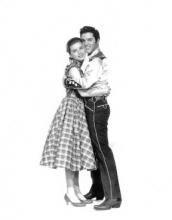
The way fans reacted to Dolores Hart’s decision to become a cloistered nun, you might have thought the movie star had announced her intention to kill herself.
Even close friends and family could not fathom why this Grace Kelly look-alike, who gave Elvis his first on-screen kiss and had her pick of acting jobs, would stow herself away in a nunnery for the rest of her life.
As if to test her resolve in those weeks before she left Hollywood, Universal Studios offered her a role opposite Marlon Brando, a role she turned down shortly after she broke off her engagement to Don Robinson, a kind and handsome businessman who loved her intensely.
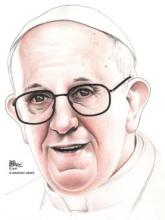
Is Pope Francis endorsing heresy?
It might look that way from the eye-catching headlines this week that made it appear everyone was bound for heaven — “even atheists!” — thanks to Jesus’ death on the cross.
The passage that prompted the reports came from Francis’ brief homily at the informal morning Mass that he celebrates in the chapel at the Vatican guesthouse.
Speaking on Wednesday, Francis said that as human beings created in the image of God, everyone has a “duty to do good.”
“The Lord has redeemed all of us, all of us, with the Blood of Christ: all of us, not just Catholics. Everyone! ‘Father, the atheists?’ Even the atheists,” he said, answering his own query. “Everyone! And this blood makes us children of God of the first class! We are created children in the likeness of God and the blood of Christ has redeemed us all!”
Cue the jaw dropping and head scratching. Atheists were pleasantly surprised, conservative Catholics were dazed and confused, and the pope’s comments raced around the Internet; for a while they were the second-most shared piece on Reddit.
So was Francis preaching a form of “universalism?" That is the unorthodox teaching that says, essentially, that all faiths are equal and all are going to heaven, especially if you are nice to people here on earth. It’s also a heresy that Francis’ predecessor, Benedict XVI, spent a career quashing every time he thought he thought he spied a hint of it in some theologian’s writings.

Pope Francis is warning Catholics not to demonize those who are not members of the church, and he specifically defended atheists, saying that building walls against non-Catholics leads to “killing in the name of God.”
“(T)his ‘closing off’ that imagines that those outside, everyone, cannot do good is a wall that leads to war and also to what some people throughout history have conceived of: killing in the name of God,” Francis said Wednesday in remarks at the informal morning Mass that he celebrates in the chapel at the Vatican guesthouse where he lives.
“And that, simply, is blasphemy. To say that you can kill in the name of God is blasphemy.”
Francis explained that doing good is not a matter of faith: “It is a duty, it is an identity card that our Father has given to all of us, because he has made us in his image and likeness.”
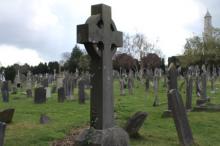
DUBLIN — Patricia Wojnar left a 32-year career in interior design to pursue a degree that wasn’t in demand: a master’s in bereavement studies.
Having seen four family members die early, she wanted to understand how to adapt.
As it turned out, the degree perfectly prepared her to enter one of Ireland’s emerging professions.
Wojnar is now a registered civil celebrant, presiding over funerals and weddings for people who refuse to associate with Ireland’s scandal-tarred Roman Catholic Church. She’s not alone; many newly minted civil celebrants are starting their own businesses as part of Ireland’s “post-Catholic” economy.
Although many observers have noted the impact of secularization and child abuse scandals on church membership and finances, only now are the Irish seeing the cultural and socioeconomic reverberations. These include a class of people willing to observe life’s most significant milestones outside the church.
VATICAN CITY — Gains in Asia and Africa are making up for losses in Europe among the world’s 1.2 billion Catholics, according to Vatican statistics released Monday, signaling a shift of the church’s center of gravity toward the Global South that was heralded by the election of the first Latin American pope.
Data published in the 2013 Statistical Yearbook of the Church also show that while the number of priests in the Americas and in Europe is declining compared to the overall Catholic population, those losses were offset by increasing ranks of permanent deacons.
There are now about 41,000 permanent deacons worldwide, a 40 percent increase over the past decade. The vast majority of them — 97.4 percent — live in the Americas or in Europe.

DERBY, Conn. — The Rev. Janusz Kukulka can’t say for sure that his parishioners are sinning more, but they sure are lining up at the new confessional booth to tell him about it.
For years, Kukulka, was content with absolving sins in a private room marked by an exit sign to the right of the altar St. Mary the Immaculate Conception Catholic Church.
But something happened during Lent this year. For the first time, Kukulka really noticed the two confessionals missing from the rear of his church. They’d been gone for four decades, ripped out during the 1970s to make room for air conditioning units during a renovation inspired by the Second Vatican Council.
They must have been a thing of beauty, Kukulka thought. He imagined their dark oak paneled doors and arched moldings to match the Gothic architecture of the church designed by renowned 19th-century architect Patrick Keely.
Their absence was striking, especially when the Archdiocese of Hartford had asked parishes to extend their confession hours during Lent, part of a public relations campaign to get Catholics to return to the sacrament of reconciliation.
So, one Sunday Kukulka announced his desire to the congregation. “I told them I wanted a visible confessional,” he said.
He got one within a week.
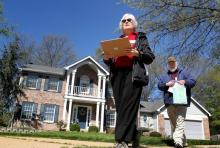
On a recent rainy Saturday, about 125 Catholics packed a basement conference room, many of them older, most of them lay people. Many were representing their parishes.
They gathered here to learn how to spread the faith, a concept that is both fundamental to Christianity and nearly foreign to modern Roman Catholics.
For the first hour of the conference, Kenneth Livengood, a parishioner at Holy Trinity Parish in St. Ann, Mo., detailed one way — door-to-door evangelization, a missionary strategy more familiar to Mormons or Jehovah’s Witnesses.